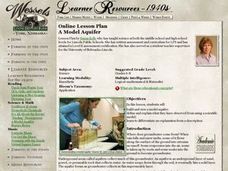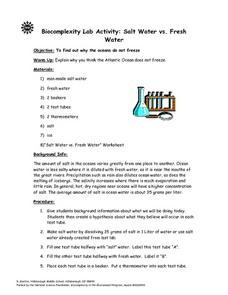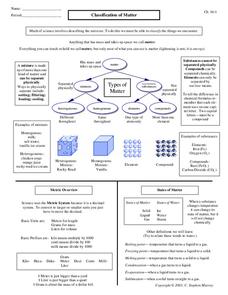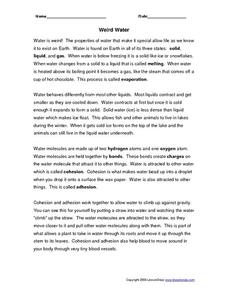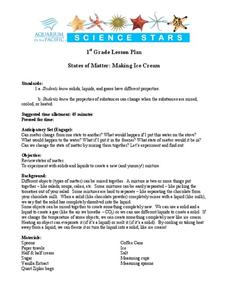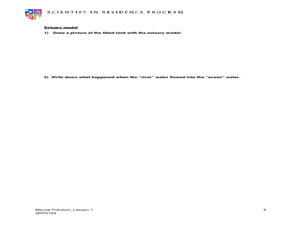Curated OER
Chapter 3 Worksheet Matter
In this matter learning exercise, students answer ten questions about matter including the phase of matter, mixtures and how they are different from compounds, the physical and chemical properties of matter and the difference between...
Curated OER
Different Types of Changes (1.2)
In this recognizing different types of changes worksheet, learners answer questions about such things as reversible change, irreversible process, climatic change, filtration process, physical change, and change in the state of a...
Curated OER
Phase Changes
In this phase change worksheet, students read about the particles in substances that speed up and slow down for substances to change phases. They answer eight questions about phase changes, the states of matter and how changing...
Curated OER
Physical vs. Chemical Changes
In this chemical and physical change worksheet, young scholars are given details about chemical and physical changes. They are given 2 examples using water and salt and they identify 15 statements as chemical or physical changes....
Curated OER
A Model Aquifer
Students build a model that depicts how water is stored in an aquifer. They examine ways in which groundwater can become contaminated.
Curated OER
Salt Water vs. Fresh Water
Students explore why the oceans do not freeze. They explain why they think the Atlantic Ocean does not freeze. Students are given background information about what they are doing. They create a hypothesis about what they believe...
Curated OER
Classification of Matter
In this matter worksheet, students compare the different types of matter, including the states of matter. Students review the metric system. This worksheet has 12 matching, 18 fill in the blank, and 4 short answer questions.
Curated OER
Weird Water
In this weird water learning exercise, students read for information and assess comprehension. In this true and false, fill in the blank, and multiple choice learning exercise, students answer ten questions.
Curated OER
Matter and Energy
In this matter and energy learning exercise, students identify substances as solids, liquids or gases, they use the kinetic theory to describe the motion of particles and they explain the conservation of mass and energy when a substance...
Curated OER
It's The States of Matter
Students investigate the properties of solids, liquids and gases. In this states of matter lesson plan, students observe dry ice and its characteristics. They calculate the density of dry ice and observe the sublimation of the dry ice...
Curated OER
Selling The Molecular Kinetic Theory
Students investigate molecule movement according to the kinetic molecular theory. In this kinetic molecular theory lesson plan, students observe demonstrations showing that molecules speed up with increasing temperature and slow down...
Curated OER
Ziplock Chemistry
Students investigate various chemical reactions when creating mixtures in ziplock baggies. In this chemistry lesson, students will recognize various chemical reactions and cite evidence. Safety and assessment strategies are included in...
Curated OER
What is an Atom?
Third graders understand that the smallest particle is an atom. In this matter lesson plan, 3rd graders make a piece of aluminum smaller and smaller to see that what's left is still aluminum. Students recognize that cutting into smaller...
Curated OER
Earth's Ecology
Students investigate the three states of water. In this physical science lesson plan, students watch the video "Earth's Ecology" and observe water in its' three states. Students record observations.
Curated OER
Making Ice Cream
First graders create ice cream in class. In this matter lesson, 1st graders discover solids, liquids and gases and the properties of each. Students produce a batch of ice cream in class using household items.
Curated OER
Modeling Estuaries
Students create a model estuary. In this modeling estuaries lesson, students identify characteristics and mix water of varying densities. Students form a hypothesis, conduct an experiment, and analyze the results.
Curated OER
Chemquest: Physical Changes or Chemical Reactions
Students explore physical and chemical changes. In this chemistry lesson plan, students will go outside to observe changes seen in nature. Students will then work in the lab to identify changes at different stations prior to doing a...
Curated OER
What's the Matter? Where Did it Go?
Eighth graders analyze questions posted on a large poster in the room and work in groups to record their response to the question on paper, rotating to the next question after two minutes have passed. They review the characteristics of...
Curated OER
Physical Equilibrium
In this physical equilibrium worksheet, students compare polar and non-polar compounds and the solubility of specific solutes in solvents. Students calculate molar heat, molar solubility, and molality for specific reactions. This...
Curated OER
The Water Cycle
Fifth graders examine the stages of the continuous water cycle that exists on Earth. They observe a water cycle model that is set up in the classroom and write descriptions of what they see. As a class, they discuss models of the water...
Curated OER
Condensation and the Water Cycle
Students explore the natural distallation process that occurs in the water cycle. They use plastic cups and cotton swabs to observe the condensation process that is evident in the water cycle.
Curated OER
As a Matter of Fact!
Students explore matter. They use a formula to measure the volume of matter.
Curated OER
Click, Clack, Moo: Electric Blanket Science
Students read Click, Clack, Moo: Cows That Type by Doreen Cronin and discuss the similarities and differences between electric blankets and regular blankets. They brainstorm a list of reasons why the farm animals wanted electric blankets.
Curated OER
Get to know H2O!
Students investigate scientific concepts and inquire about physical states of matter. The transition of water is considered and is easy to facilitate because of its abundance and often observed physical changes.






